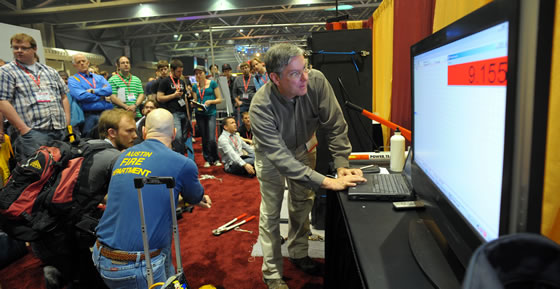 |
 |
 |
|
News & Notices
Profiles -
News From:
Commissions
Conference & Stage Expo
For the Record
 |
||
|
Why We Do It - Or
Zen and the Art of Technical Production
We are, for the most part, actually a very lucky group; most of us have chosen to work in technical entertainment because it was our choice. We were not forced to “follow our parents” into their field, or “take over the family firm.” Most of us didn’t choose this work to meet the famous celebrities, work in glamorous venues, or travel to see the world. Why did we choose to labor at odd hours in the dark for this very unusual profession? And what do we get out of it: material wealth, social status, pay and benefits, recognition, and reputation? The actors, designers, directors, producers, and playwrights all talk about working for their art and receive public and personal gratification from executing their art. But what about us? Even the government doesn’t recognize our work as art; we aren’t classified or exempted as artistic. We must search for a vision of art within our chosen field of technical production. But we rarely find art in coiled cable, precisely aligned patterns projected on someone else’s scenery, or space left over in the tour truck where there wasn’t space before. We must find it in ourselves; we must view work in a more expansive concept; we must see it as contributing more to our lives than the material, but as a spiritual contributor. Making a meaningful difference and exercising a greater control over your own destiny are a result of being conscious of the choices we make about the work we do and the way we actually carry out the work. There is an old adage, “you can have it fast, cheap, or correct; choose two.” Yet there is the older Greek saying of “moderation in all things.” Choosing to perform at less than a personally fulfilling level builds and builds. Choosing not to follow your own road suppresses self-expression and creativity, which leads to unhappiness. Unhappiness or dissatisfaction with one’s work is the number one risk factor for heart disease -- a greater contributor than smoking, high cholesterol, or hypertension. Finding the path to a fulfilling effort can be both mentally and physically rewarding and benefit you in the long term. The passage to successful inclusion of creative self-expression in one’s workplace can be long and difficult, but we work in a profession that prides itself on tolerating, if not encouraging, expression. It was either Harold Burris-Meyer or Robert Porterfield who once said that you should do your work for the three percent of the audience that knows the difference; breaking their willing-suspension degrades the event for them. The remaining 97 percent of the participants are joyfully pleased. Of the entire audience, we, more than anyone, know the difference, and to that portion of that audience and ourselves we must dedicate our efforts. Make your life’s work fulfilling; enthrall and thrill your coworkers and technical ensemble members. It will only benefit everybody in an infinite number of ways, and you’ll be happier and healthier. |
||
United States Institute for Theatre Technology, Inc.:
© 2010 Volume L, Number 8